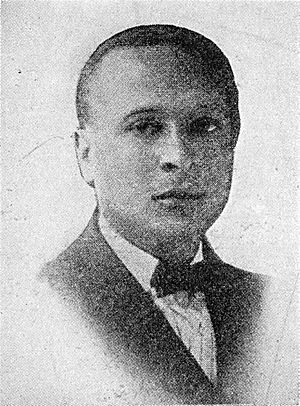Leslie Pinckney Hill facts for kids
Quick facts for kids
Leslie Pinckney Hill
|
|
|---|---|
 |
|
| Born | May 14, 1880 |
| Died | February 15, 1960 (aged 79)}} Philadelphia, Pennsylvania, US
|
| Alma mater | Harvard University (BA, MA) |
| Occupation | Educator |
| Known for | First president of Cheyney University of Pennsylvania |
Leslie Pinckney Hill (born May 14, 1880 – died February 15, 1960) was an important American teacher, writer, and community leader. He is best known for being the first president of Cheyney University of Pennsylvania. From 1913 to 1951, he led the Institute for Colored Youth in Philadelphia. He helped move the school and change its name to Cheyney State Teachers College, which is now Cheyney University.
Contents
Leslie Pinckney Hill's Journey
Early Life and Education
Leslie Pinckney Hill was born in Lynchburg, Virginia. His father had been a slave before. Leslie went to primary school in his hometown. He also played the trumpet. Later, his family moved to East Orange, New Jersey, where he attended high school.
Leslie was a very bright student. He skipped his junior year of high school. In 1899, he was accepted into Harvard University. While at Harvard, he worked as a waiter to help pay for his studies. He took classes with famous thinkers like William James. He was also very active in debating. Leslie did so well that he was chosen for Phi Beta Kappa, an honor society. He graduated with honors in 1903. He then stayed at Harvard for another year to earn a master's degree in education.
Leading a College
After college, Hill taught at Tuskegee University from 1904 to 1907. He then became the principal of the Manassas Industrial School for Colored Youth from 1907 to 1913.
In 1913, Leslie Pinckney Hill became the principal of the Institute for Colored Youth in Cheyney, Philadelphia. He stayed there until 1951. During his time, he helped change the school's name and its purpose. It became Cheyney State Teachers College. He was also the college's first president.
Writer and Community Leader
Besides being a great educator, Hill was also a writer. He wrote poems and essays. In 1928, he published a play about Toussaint Louverture, a famous leader.
In 1944, Hill started Camp Hope. This was a special camp for children who needed extra support. It was located in Delaware County, Pennsylvania. Leslie Pinckney Hill was also part of the Harlem Renaissance. This was a time when African-American art, music, and literature became very popular.
Leslie Pinckney Hill passed away in Philadelphia in 1960 from a stroke. He left behind a legacy as a dedicated educator and community helper.
 | Shirley Ann Jackson |
 | Garett Morgan |
 | J. Ernest Wilkins Jr. |
 | Elijah McCoy |

